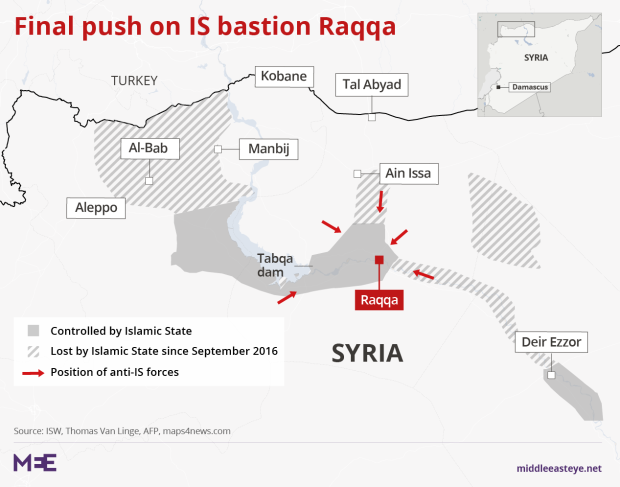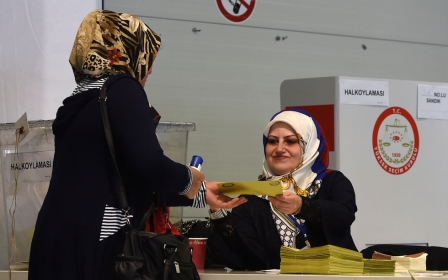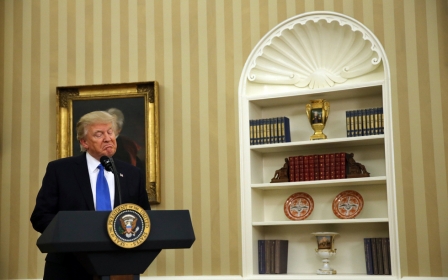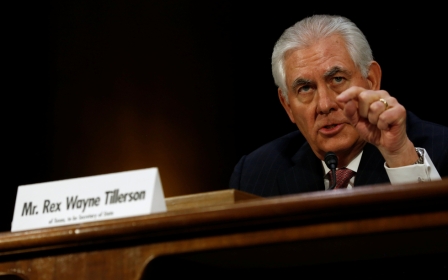Tillerson in Turkey: Five big issues to watch
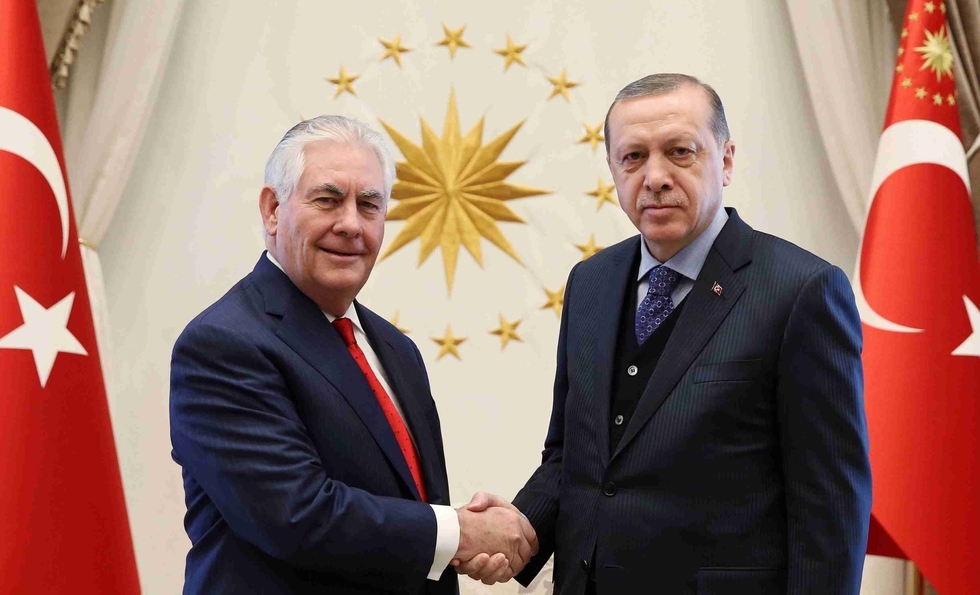
NEW YORK, United States – US Secretary of State Rex Tillerson’s talks on Thursday with Turkish leaders about defeating the Islamic State (IS) group are widely seen as a chance to boost relations with a key partner which is growing ever-more irked by its western allies.
But Tillerson’s sit-downs with President Recep Tayyip Erdogan and other Turkish officials on 30 March in Ankara have wide cracks to smooth over – not least of which is an upcoming referendum on rewriting Turkey’s constitution to give Erdogan broad new powers.
Meanwhile, fighting IS is complicated by Ankara’s fears of Kurdish militants and by talk of “safe zones” for refugees in Syria’s civil war. Turkish officials also continue to fret about a US-based cleric linked to last year’s failed coup.
Ahead of the visit, Middle East Eye spoke with Robert Pearson, Washington’s former envoy to Turkey, scholars and officials from the two-month-old administration of President Donald Trump for the lowdown on what to expect in Ankara.
1. Referendum that expands Erdogan’s powers
Passions are running high in Turkey ahead of a 16 April referendum on boosting Erdogan’s powers, which has seen Ankara brawl with Germany and The Netherlands over their halting of campaign rallies for Turkish expatriates living in Europe.
Trump’s administration, and Tillerson himself, seem to care little about human and political rights
- Jonathan Cristol, World Policy Institute
Erdogan even dredged up such World War Two-era insults as “Nazi” and “fascist” to blast those two NATO allies. According to a senior State Department official, Tillerson is “acutely aware” of political sensitivities ahead of the vote.
According to Pearson, Washington’s ambassador to Turkey from 2000 to 2003, Tillerson will likely dodge controversy and state his support for democracy in a country that, according to rights groups, has become more authoritarian and prone to quashing dissent.
“The difficulty is that Erdogan has taken support for Turkish democracy to mean support for his purge, crackdown and his push to get practically unlimited presidential power,” Pearson told MEE. “So it will be a little bit of a delicate statement from Tillerson to endorse democracy but not endorse everything that’s happened since [the coup of] July 15.”
Jonathan Cristol, a scholar at the World Policy Institute, a think tank, agreed.
“The referendum is the subject of much criticism, but I would not expect Tillerson to bring it up, both because the US needs Turkey’s cooperation in Syria and because Trump’s administration, and Tillerson himself, seem to care little about human and political rights,” Cristol told MEE.
2. Turkey wants Gulen
Turkish officials are itching to get their hands on Fethullah Gulen, a Pennsylvania-based cleric whom Ankara accuses of orchestrating the failed coup last July. The former administration of President Barack Obama did not act on Turkey’s request to give him up.
A State Department official, speaking with reporters on condition of anonymity, said that Turkey’s extradition request is “with the Department of Justice right now” but that Tillerson is “prepared to respond” to queries from his Turkish counterparts.
According to Pearson, the Turks will likely pressure Tillerson to hand over Gulen and vaunt the case for extradition on television during his visit, but that the secretary is “very unlikely to make a political deal, though it’s not outside the realm of possibility”.
However, Barak Barfi, a scholar at the New America Foundation, a think tank, said that Trump’s team would consider bypassing the courts and using Gulen as a bargaining chip to win stronger Turkish support towards its key foreign policy goal: crushing IS.
“If he can get Erdogan on board just by giving up some guy, Trump would do it,” Barfi, who frequently visits Turkey, told MEE. “There is no separation of powers in this administration; they don’t play by the playbook.”
3. No-fly and safe zones
Since the Syrian uprising against President Bashar al-Assad began six years ago, the US and other powers have regularly discussed creating “no-fly zones” and “civilian safe zones,” but have made little headway.
At talks among the 68-nation coalition fighting IS in Washington this month, Tillerson revived the idea by speaking of “interim zones of stability” to help refugees return home in the next phase of fighting against IS zealots in Syria and Iraq.
Turkey has long called for such safe zones in Syria, particularly along its 911km-border with the fractured state. Another State Department official said that bringing stability to the “borders of our critical allies” would “be a key focus of our discussions in Ankara”.
For Barfi, the question of safe zones remains tricky for Washington, as it may need American soldiers on Syrian soil defending them. “You have to patrol those zones, and that means mission creep, and you have no exit strategy,” Barfi said.
4. The race to Raqqa
The main focus of talks in Ankara is the US-led offensive on IS strongholds in Syria, according to the State Department officials. IS militants have lost ground in Iraq and Syria, with three separate forces, backed by the US, Turkey and Russia, advancing on the group’s de facto capital, Raqqa.
The militants are outgunned and outmanned and are expected to lose Mosul, Raqqa and other strongholds in the coming months while switching to car bombings and other insurgency tactics as their self-declared caliphate shrinks.
But, according to Barfi, diplomacy then gets tougher, as Washington, Ankara, Tehran and Moscow have competing visions of what Syria should look like after the war and whether Assad should be allowed to retain power.“Turkey has the potential to be an important ally with the Trump administration, so Tillerson won’t push Ankara too much,” Barfi told MEE. “As it stands, the Trump administration does not have a complete plan on ISIS. The process hasn’t played itself out yet.”
5. The Kurdish question
A major sticking point between the US and Turkey is Washington’s backing for the Syrian Kurdish YPG militia, which Ankara considers part of the Kurdistan Workers’ Party that has been fighting an insurgency for three decades in Turkey.
Turkey has the potential to be an important ally with the Trump administration, so Tillerson won’t push Ankara too much
- Barak Barfi, New America Foundation
Ankara views Kurdish nationalism as a major threat. For Washington, the Kurdish fighters are one of the most effective forces against IS for retaking Raqqa alongside Arab fighters in the US-backed Syrian Democratic Forces (SDF).
According to Pearson, there “is a workaround, but the parties haven’t come to that point yet”.
The former diplomat and scholar at The Middle East Institute, a think tank, said Washington could broker deals to allay Ankara’s security fears and offer it an “advisory and supporting role in the post-captured governance” of northern Iraq and northeastern Syria.
New MEE newsletter: Jerusalem Dispatch
Sign up to get the latest insights and analysis on Israel-Palestine, alongside Turkey Unpacked and other MEE newsletters
Middle East Eye delivers independent and unrivalled coverage and analysis of the Middle East, North Africa and beyond. To learn more about republishing this content and the associated fees, please fill out this form. More about MEE can be found here.



